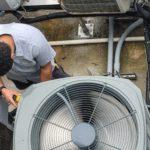There comes a point every spring – maybe summer if you’re really holding out – when you switch your HVAC system to “cool” for the first time in months.
If you’re like a lot of homeowners, that brief flip of the switch is the most attention you give your air conditioning all year.
So, are you sure your A/C is ready to cool your home all summer?
Do you know how your A/C has endured the winter season? Are you aware of what care it might need in order to keep on ticking?
The way to answer these questions – and keep yourself and your family comfortable without any surprises – is with a seasonal A/C tune-up.
An A/C tune-up is a full clean-and-check of your air conditioning system, including its indoor and outdoor components.
Here are six reasons why you need a professional A/C tune-up this spring, and every spring:
An A/C Tune-up is Not A Scam
A lot of people hear “A/C maintenance plan” and think “frivolous add-on I don’t need.” We understand – we’re all wary of sales gimmicks, and protective of our wallets.
Plus, many of us are familiar with older air conditioning systems, which didn’t require much proactive maintenance.
So what’s the deal? Are A/C tune-ups really necessary?
In a word, yes. It turns out that modern A/C systems not only benefit from proactive maintenance, but demand it. It’s critical for their performance and longevity.
In days gone by, air conditioning units – much like automobiles – were bigger and bulkier. They were made of heavier-gauge steel that endured for decades without a lot of fuss. In our work, we’ve seen old air conditioners half-buried under mudslides that were still chugging (loudly and a bit too hot, but working nonetheless).
This is not the case with today’s air conditioners. New A/C systems are smaller and lighter. They are made of thinner, flexible materials, including stainless steel, aluminum, copper, and plastics. These materials allow faster, better heat transfer.
The newer materials are strong, but they are not as indestructible as the older materials. So today’s air conditioners are more susceptible to wear and tear. With usage, time, and the elements, they degrade faster than their older counterparts did.
This isn’t all bad – it’s actually the price we pay for much better energy efficiency (which we’ll talk about in a bit). But it means that new A/C systems need regular cleaning, maintenance, and fine-tuning to stay in peak condition throughout their lifespan.
So when your A/C installers recommend a seasonal tune-up, they have no ulterior motives. Rather, they are standing behind the new technology they’re delivering. And they’re showing you they’re willing to help you care for it properly.
A/C Maintenance Protects Your Warranty
Manufacturers of air conditioning systems commonly offer warranties that are valid only with routine maintenance of the system. In other words, A/C tune-ups are often baked into A/C warranty terms and conditions.
For example, an HVAC manufacturer might offer a five-year warranty that covers the cost of any repairs to the system – provided you’ve maintained the system with seasonal tune-ups. And the manufacturer can ask for your service records as proof.
This isn’t a case of HVAC manufacturers holding you hostage to regular maintenance. Rather, it’s insurance against an A/C breakdown from a preventable problem.
At Kowalski, we also protect and extend your A/C warranty by registering your product for you. Many HVAC manufacturers tack an additional number of years to their warranties if customers register their products within a certain timeframe. We take care of product registration as part of your A/C installation or replacement project.
Regular Maintenance Prevents A/C Emergencies
When your air conditioning fails and outdoor temperatures are high, you and your family are in distress. This is particularly true if there are children or seniors in your home. Extreme heat can be harder to combat than extreme cold, so a nonfunctional A/C system can quickly progress from an inconvenience to an emergency.
Regular A/C tune-ups help you avoid this situation.
A quality A/C tune-up is actually a thorough A/C inspection: it assesses the state of your entire system and finds problems before they start.
Here’s what a professional HVAC company should do as part of each A/C tune-up:
- Clean or replace all filters.
- Check refrigerant levels for proper operation and safety standards.
- Examine the evaporator, which transforms liquid refrigerant into gas.
- Clean, clear, and check the integrity of all the outdoor A/C components. This includes the compressor (which exerts pressure on gas refrigerant to release heat), the condenser unit and coil (which hold and move liquid refrigerant), and the fan.
- Examine the entire condensate drain line and clear any blockages.
- Perform a leak check throughout the system to detect and repair developing or active leaks.
- Test all electrical components within the A/C system to ensure they meet manufacturer specifications. This includes the compressor and fan motors, the capacitor (which sends and stores electricity to the motors), and the contactor (the on/off switch for the system).
- Test all analog and digital accessories, including thermostats.
- Run a cooling cycle to detect refrigerant charge and pressure, and verify optimal cooling throughout your home.
- Make or schedule any necessary repairs or updates.
This kind of A/C tune-up covers all your bases and puts you ahead of the game. No more frantic service calls to HVAC companies during heat waves, when you’re competing with everyone else’s A/C emergencies.
Most A/C Repairs are Due to the Lack of Maintenance
Sudden, unforeseen air conditioning breakdowns do happen – but they’re rare.
The overwhelming majority of A/C breakdowns can be observed while they’re still developing. This means they can be addressed in advance – with seasonal A/C tune-ups.
Following are some common causes of A/C system overwork, underperformance, and ultimately failure. Proactive maintenance detects and remedies all of them, saving you potentially thousands of dollars in premature repairs and replacements:
- Dirty, clogged filters, which obstruct airflow.
- Dust and debris on the outdoor condenser unit, particularly from homes near a lot of foliage or on new construction sites.
- Corroded aluminum condenser coils from animal or environmental waste.
- Improper refrigerant levels, which put too much or too little stress on the compressor.
- A leak in the system (and possibly into your home) from a clogged condensate drain line, a failing condensate pump (if you have one), an aging drain pan, a frozen evaporator coil, or something else.
- Electrical component wear and tear. This often produces troubling sounds (like clicking or loud humming) before preventing the compressor and fan motors from starting.
- Clogs or corrosion caused by snow and ice buildup around your outdoor A/C unit or any exhaust pipes. While your A/C unit is built to withstand the elements, lingering snow and ice take a toll that a spring tune-up will catch.
A/C Tune-ups Lower Your Energy Bills
Newer air conditioning systems are designed – partly through their lighter materials, which we described earlier – to be energy efficient. That is, they are built to deliver as much cooling as possible while using the least amount of energy.
In fact, all A/C systems have a SEER (Seasonal Energy Efficiency Ratio) rating that scores their performance in this regard. SEER ratings range from 13 to 25. The higher the SEER rating, the more energy-efficient the air conditioner.
And the more energy-efficient the air conditioner, the lower your monthly energy bills.
Unless you aren’t maintaining your A/C.
Your A/C is a complex system of machinery and technology. No matter its advertised energy efficiency, it will struggle to run – meaning it will guzzle more fuel – with excessive debris, moisture, age, or neglect.
Ignored A/C systems can’t be energy-efficient A/C systems. Their components require routine inspection, cleaning, and recalibration in order to run smoothly. And smooth performance maximizes energy usage and saves you money.
In other words, the SEER rating isn’t plug-and-play. Without seasonal maintenance, your A/C efficiency results may vary, to the detriment of your wallet.
Now, if you have an older A/C system, its age and size drive efficiency down, and your energy bills up. Seasonal tune-ups ensure that an A/C system past its prime runs as efficiently as it possibly can. This probably won’t generate the efficiency of a new A/C system, but it probably will take the edge off of your utility costs.
Seasonal A/C Tune-ups Pay for Themselves
Aside from your home itself and the vehicles you drive, your HVAC system is one of the top investments that you’ll make as a homeowner. It is among the highest-priced items you have.
Giving it regular attention with seasonal tune-ups is a no-brainer. Here’s why:
- The average lifespan of A/C systems today is about 10 years. With routine tune-ups, you can extend that to 15-20 years or longer.
- The average cost of an HVAC tune-up is between $100 and $200 per unit. Contrast this with the average cost of a new central A/C system, which at the lower end, for a lower-efficiency model, in a 1,500-square-foot home, is nearly $3,000 before labor costs. You could service both your air conditioner and your furnace with a tune-up each year for 10 years and still come out ahead.
- Air conditioner parts and repairs are costly too, even before labor. And repair costs tend to be recurring costs until you decide to replace your A/C. The average for a compressor alone is between $1,350 and $2,300.
The bottom line is that A/C tune-ups not only protect your equipment, prolong its use, and keep you safe, but they also make a huge amount of financial sense. Most quality HVAC companies even offer yearly maintenance plans that take the hassle out of remembering to schedule tune-ups.
The only downside to A/C tune-ups is the time you must set aside for them. But it’s a small price to pay for the benefits you receive.
_____________
Ready for a tune-up on your own A/C system in the South Hills of Pittsburgh? If you’ve never had an A/C tune-up, or just haven’t scheduled your spring maintenance yet, we’re happy to help you out. Contact us and we’ll make sure your A/C system is in tip-top shape and ready for a Pittsburgh summer. We also offer maintenance plans that take care of your HVAC system year-round.
We look forward to serving you!





